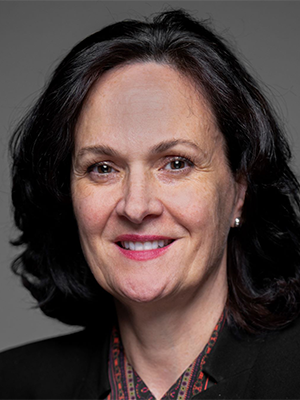NICHD Pediatric and Adolescent Gynecology Training Program

- Veronica Gomez-Lobo, MD, Program Director
- Tazim Dowlut-McElroy, MD, Associate Program Director
- Jacqueline Maher, MD, Staff Clinician
- Ariel Cohen, MD, Clinical Fellow
- Swetha Naroji, MD, Clinical Fellow
- Sofia L. Getachew, MSPM, Contractor
The Pediatric and Adolescent Gynecology (PAG) Fellowship training program is a two-year program, not accredited by the ACGME (Accreditation Council for Graduate Medical Education), comprising faculty from the National Institute of Child Health and Human Development (NICHD), Children's National Health Systems (CNHS), and the MedStar Washington Hospital Center (MWHC). The mission of the fellowship program is to ensure that the graduate possesses the knowledge, skills, and professional attributes essential for the function as a consultant to pediatricians, family practitioners, obstetricians, and gynecologists for girls from birth up to age 18–21 years with pediatric gynecologic concerns, as well as for women born with congenital anomalies. Qualified candidates must be U.S. Citizens or Green Card holders and have completed an accredited residency in Obstetrics and Gynecology in the United States and be Board-eligible in this specialty.
Program structure
Currently, the fellowship alternates between recruiting one to two fellows per year. A schedule is established by which fellows rotate through general pediatric and adolescent gynecology clinics (including a heavy-menses clinic), and surgeries, specialty clinics (reproductive endocrine, Turner syndrome, PROUD [positive re-evaluation of urogenital differences clinics, or disorders of sex development] and vulvar dermatology clinics), colorectal surgery at CNHS, and research and consult/clinics at the NIH Clinical Center. The outpatient services do not depend on fellows for clinical care, which allows flexibility to maximize the educational experience. Surgeries are performed by the fellow on call with a resident, and the fellow functions as the surgical instructor during such cases. Complex surgeries are performed by both fellows as co-surgeons. Rotations, including one month in Child Abuse, are scheduled during the second year of fellowship. Electives in Adolescent Medicine (eating disorders), as well as travel to other sites for further complex anomaly training are available.
For successful completion of this training program, the fellow is required to design, implement, complete, describe, and report at least one research study. A second multi-center project must be designed and submitted, or collaboration with a project submitted to the Fellows Research Network at North American Society for Pediatric and Adolescent Gynecology (NASPAG) is required. During the fellowship, fellows have thirty percent of their time protected for clinical research. The research takes place throughout the two years of training on 1.5 weekdays, except during outside rotations.
Structured training includes a series of introductory seminars geared to the first-year fellows, which take place from July to September in the first year. The introductory seminars provide a historical perspective and basic understanding of the practice of Pediatric and Adolescent Gynecology and Reproductive Endocrinology (REI), as well as of statistics. Fellows are required to attend a weekly colorectal conference, a monthly DSD (Differences of Sexual Development) clinic conference, a monthly Turner’s clinic conference, combined REI/PAG Journal Club/case conferences, lectures, and quarterly research meetings. In addition, fellows are encouraged to attend the monthly Reproductive Endocrine Journal club and DSD-TRN (Translational Research Network) case conference.
In addition to larger groups, mentors of individual laboratories to which the fellow is affiliated generally meet on a weekly basis to review research progress. Furthermore, fellows are encouraged to participate in the didactic training offered at national meetings, such as the NASPAG, the American Society for Reproductive Medicine, the Society for Gynecologic Investigation, and the Pediatric Endocrine Society. Moreover, fellows are encouraged to attend specialty meetings in their chosen interest areas, such as the Oncofertility Consortium and Differences in Sex Development–Androgen Insensitivity annual meetings.
Application Information
Applications are submitted using the common application form on NASPAG. They are accepted in July before the anticipated start date, and interviews are typically held in August or September before the start date. Selection of candidates is processed through the National Resident Matching Program (NRMP). One to two positions are available in alternating years.
Please visit the URL below for detailed program information: https://www.cc.nih.gov/training/gme/programs/pediatric_adolescent_gynecology.html
Publications
- Dwiggins M, Brookner B, Fowler K, Veeraraghavan P, Gomez-Lobo V, Merk DP. Multidimensional aspects of female sexual function in congenital adrenal hyperplasia: a case control study. J Endocr Soc 2020;4(11):1-26.
- Clawson A, Strang JF, Wallace GL, Gomez-Lobo V, Jack A, Webb SJ, Pelphrey KA. Parent-child concordance on the pubertal development scale in typically developing and autistic youth. Res Autism Spectr Disord 2020;77:1-11.
- Grimstad FW, Fowler KG, New EP, Ferrando CA, Pollard RR, Chapman G, Gray M, Gomez Lobo, V. Ovarian histopathology in transmasculine persons on testosterone: a multicenter case series. J Sex Med 2020;17(9):1807-1818.
- Dhamankar R, DiNonno W, Martin KA, Demko ZP, Gomez-Lobo V. Fetal Sex Results of Noninvasive Prenatal Testing and Differences With Ultrasonography. Obstet Gynecol 2020;135(5):1198-1206.
- Nahata L, Gomez-Lobo V, Meacham L, Appiah L, Childress K, Hoefgen H, Dwiggins M, Whiteside S, Bjornard K, Rios J, Anazodo A, Finlayson C, Frias O, Woodruff T, Moravek M. 2019 Pediatric Initiative Network: progress, proceedings, and plans. J Adolesc Young Adult Oncol 2020;9(4):457-463.
Contact
Veronica Gomez-Lobo, MD, Program Director
veronica.gomez-lobo@nih.gov
Tel: 301-594-1176
Sofia Getachew, MSPM, Program Coordinator
sofia.getachew@nih.gov
Tel: 301-451-1466
Pediatric and Adolescent Gynecology Training Program
NICHD, NIH
10 Center Drive
Building 10, Room 8N248, MSC 1840
Bethesda, MD 20892-23330


